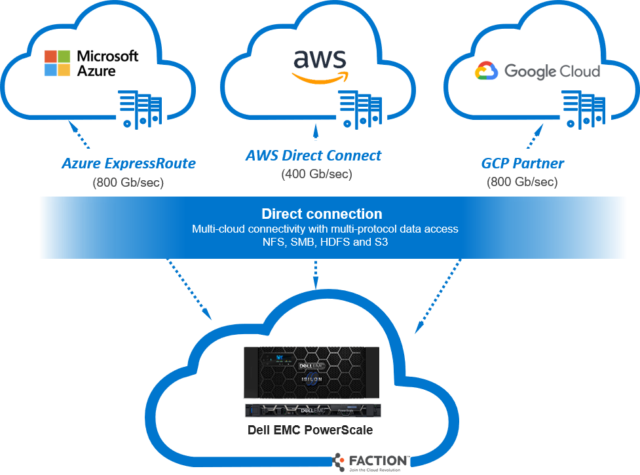The future of IT is hybrid – a world that balances the right public cloud services with the right on-premises infrastructure to provide the performance, scale, functionality and control required of modern applications and development paradigms. As customers consider this hybrid model, it is important to take a data-first approach. With data being the most valuable asset of your business, you must be mindful of how it is to be accessed, managed, protected, and secured. In this blog we demonstrate examples of this approach – from sharing data across clouds, to protecting data from cyberattacks, and cloud-enabled disaster recovery for quickly resuming normal operations.
It’s a multi-cloud world
Most organizations today find themselves working with two or more cloud providers to meet workload-specific requirements. Each of these clouds offers benefits and strengths – so it is no surprise that organizations end up managing a mix of investments in multiple clouds.
What we do – in collaboration with Faction – is provide a consistent way to manage storage and data protection for multiple clouds from a single place with one uniform experience.
Our current multi-cloud portfolio consists of:
◉ Dell Technologies Cloud Storage for Multi-cloud combines the performance and enterprise-grade features of Dell Technologies storage systems (Dell EMC PowerScale, PowerStore, PowerMax and Unity XT) and the best native cloud services in AWS, Azure, Google Cloud and Oracle Cloud to offer customers simple, flexible, direct multi-cloud access.
◉ Dell Technologies Cloud PowerProtect for Multi-cloud is a fully managed service that enables customers to efficiently protect their data and applications across public clouds in a single destination via a low latency connection.
Today we are introducing new multi-cloud storage and data protection capabilities, as well as sharing the results of third-party studies that demonstrate the power and flexibility of our multi-cloud offerings.
Delivering secure, simple, managed cyber recovery for multi-cloud

Protecting against ransomware and other cyberattacks is quickly rising in importance for both IT and business executives. With the average cost of an attack being $13M, it’s easy to see why this is so concerning. As IT deployments become more complex, with on-prem deployments combined with applications running in multiple public clouds, it is hard to build a world class centralized solution to protect critical data from the modern threat of sophisticated cyberattacks… until today.
With
PowerProtect for Multi-cloud customers can protect their business from ransomware, insider attacks and other cyber threats with confidence. Today we are building on this solution by adding new capabilities to combine the security of our battle hardened
Dell EMC PowerProtect Cyber Recovery with the simplicity and economics of the cloud.
Customers benefit from a both physical and logical isolation of their critical data – an air-gapped and secure Cyber Recovery vault in a cloud-adjacent Faction-powered data center. Data integrity is further ensured through enterprise-grade features like data immutability, and our CyberSense intelligent analytics, which enables data recovery with the confidence that it is free from malware or other compromise.
Should a cyberattack occur, your data can be recovered from the vault back to your data center, or the cloud of your choice: AWS, Azure, Google Cloud and Oracle Cloud – and you can get back to business.
Enabling simplified disaster recovery with Superna for PowerScale for Multi-cloud
PowerScale customers looking for a full cloud-enabled disaster recovery solution can now take advantage of
Superna Eyeglass DR Manager for replication orchestration and metadata management. With the hosted software from Superna, users can protect themselves from disaster with confidence, and enable continuous business operations by leveraging the cloud instead of incurring the cost and complexity of a dedicated secondary disaster recovery site.
Using Superna Eyeglass DR Manager with PowerScale for Multi-cloud, customers can replicate data from their data centers to Faction’s cloud-adjacent data center. The enterprise-grade feature-set enables one button failover, flexible SyncIQ scheduling, continuous readiness monitoring, DR testing, data loss exposure analysis, reporting and more. Applications can be recovered to the cloud-adjacent data center, or in the customer’s public cloud of choice. The solution can be purchased directly from
Dell Technologies via the Extended Technologies Complete program.
PowerScale for Multi-cloud delivers massive performance at scale and dramatic cost savings
Our PowerScale for Multi-cloud service allows for a single data repository to be served to multiple clouds. Customers can take advantage of compute resources across the clouds simultaneously to process their data sets. There is zero data gravity, as the data is not being transferred from one cloud environment to another, but simply accessed when needed. This approach to multi-cloud data access avoids the complexity, cost and time of managing multiple data copies.

Recently, the Enterprise Strategy Group (an IT analyst research and validation agency), conducted two testing audits to verify the functionality and performance of PowerScale for Multi-cloud.
The
first study explored a demanding, data-intensive genomic processing workload. The validation showcased how a challenging workload can benefit by using the processing capabilities of multiple clouds with a single data set provided by PowerScale.
Benefits noted in the report include:
◉ Massive scale: GPU compute cores were used simultaneously across the three clouds and scaled up to one million cores, illustrating the ease of tapping dynamically into compute resources of multiple clouds. While spot instances are offered by public clouds at a discount, there is no guarantee of their availability. The workload was moved between clouds to take advantage of the availability and low cost of spot instances.
◉ Extreme performance: The solution can reach up to 2 Tb/s simultaneous multi-cloud throughput via multi-protocol data access on PowerScale for NFS, SMB, HDFS and S3. The self-service bandwidth re-provisioning enabled the re-allocation of the supported service bandwidth between the clouds to ensure that even the most demanding workload gets the performance that it needs.
◉ Dramatic storage cost savings: Storage costs were as much as 89% lower with PowerScale for Multi-cloud, when compared to managing three copies of data across three clouds.
The second
ESG study focused on PowerScale for Microsoft Azure, our all-inclusive, zero egress solution for Azure customers. In addition to validating a genomics workload, ESG explored PowerScale’s integration with native cloud services, using Azure HDInsight for an analytics workload. HDInsight worked seamlessly, integrating with PowerScale’s native HDFS data access protocol. PowerScale did what it does best, scaling throughput linearly as the Hadoop worker node count increased, with no sign of saturation. ESG called the service “one of the most performant cloud file services we know of in the market today.”
Additionally, we continue to expand our multi-cloud services to new regions, most recently adding Chicago to the list of Azure deployment location choices.
Source: delltechnologies.com







0 comments:
Post a Comment